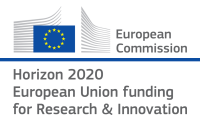

URBANITE promotes a long-term sustainable ecosystem model to adopt a data-driven decision making approach in urban mobility planning.
The URBANITE ecosystem model aims to find a trade-off between the needs and expectations of civil servants, citizens and different mobility data stakeholders in terms of the new emerging technologies and their trust in deploying the solutions offered by such technologies.
Urban mobility faces more significant long-term uncertainty and complexity generated by three main factors: the demand for growth in urban environments, the urgency for developing more sustainable models, and strategies for reducing emission levels. On the other hand, new technologies, disruptive business models and trends are changing the landscape of urban planning and mobility management in cities. The fast growing technological development in the transport modes as well as emerging business models such as autonomous driving, micro-mobility, connected vehicles, electromobility, mobility as a service (MaaS), new models of vehicle ownership, etc. embrace specific challenges in the deployment phase of technical solutions.
Covid-19 reveals the need for robust mobility solutions
In addition, the Covid-19 crisis has made us aware of the fragility and sensitivity of our models under external variants, identifying the need for agility to respond to new mobility restrictions if necessary.
All these challenges ask for new advancements in the mobility planning processes and methods which can help public administrations and policy-makers better understand upcoming challenges. In this sense, URBANITE explores mobility specific challenges as well the acceptance of disruptive technologies to enable data-driven decision making in urban mobility planning. The project aims to reach the following principles by both deployment of a participatory approach and development of a technical platform:
- Make the most out of data
- Make the data management process more efficient
- Learn from short- intermediate- and long-term trends to improve urban mobility
- Identify potential problems and delimit unforeseen consequences thereof
- Analyze future scenarios and potential action points (what-if analysis)
- Create public policies and services “with” people and not just “for” them
- Foster cross-departmental collaboration by creating an urban ecosystem
- Boost and guide an efficient and successful digital transformation
First findings from URBANITE’s pilot cities
After one year of research and close collaboration with all relevant stakeholders, the first results are available as following:
- A better understanding of the use cases from the four participant cities including Amsterdam, Bilbao, Helsinki and Messina has been achieved.
- Pilot cities conducted Social Policy lab (SoPo Lab) participatory sessions during spring to map out challenges, risks and opportunities of data driven decision-making.
- The 1st version of the URBANITE architecture has been developed as the basis for defining the next steps of its deployment and integration.
- A semantic model specification and common data structures has been determined based on the analysis of that data sources available and relevant to the project use cases.
- The strategy and algorithms for data modelling and visualizations which could be applicable to the URBANITE domain has been defined.
Our partners are: Alma Digit, Comune di Messina, Engineering Ingegneria, Forum Virium Helsinki, Fraunhofer Fokus, Jozef Stefan Institute, Stiching WAAG Society, Gemeente AMSTERDAM, Ayuntamiento de Bilbao, Cluster de Movilidad y Logística de Euskadi and TECNALIA, that coordinates the project.
This project has received funding from the European Union’s Horizon 2020 research and innovation program under grant agreement number 870338.
Additional information
